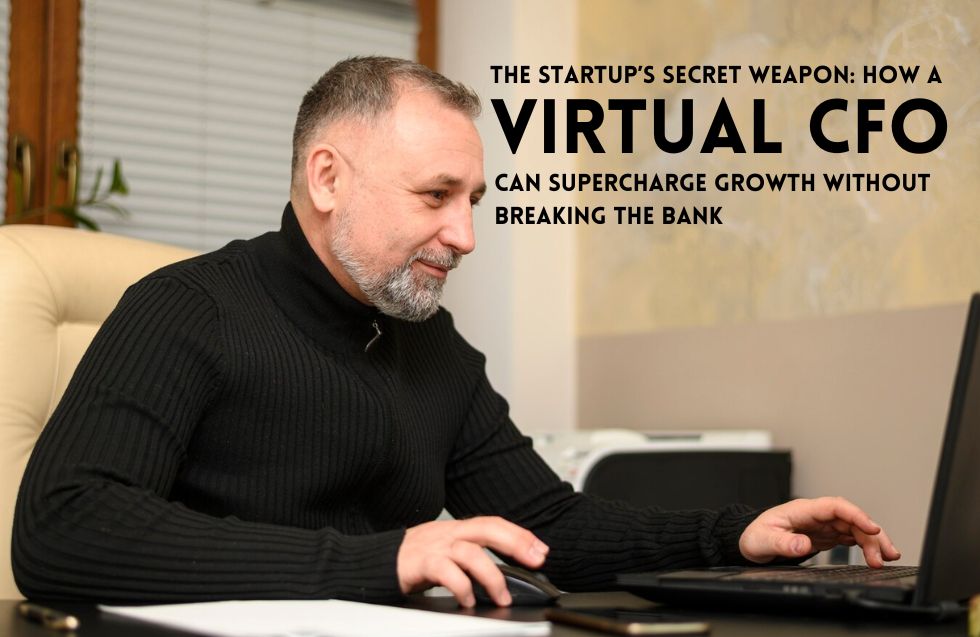In today’s fast-paced startup ecosystem, staying ahead often feels like navigating a minefield. Founders are expected to juggle innovation, operations, funding, and market strategy—all while keeping costs lean. Enter the Virtual CFO (vCFO), a game-changing asset for startups looking to scale efficiently. Unlike traditional CFOs, a vCFO delivers expert financial guidance on a flexible, cost-effective basis, making them the secret weapon for growth-driven startups.
What is a Virtual CFO?
A Virtual CFO is a financial expert who offers the services of a Chief Financial Officer (CFO) without the need for a full-time hire. They work remotely or part-time, providing strategic financial insights, managing cash flow, forecasting revenue, and ensuring the company’s financial health. For startups, this means gaining access to top-tier financial expertise without the hefty salary and benefits associated with a traditional CFO.
Why Startups Need a CFO—Virtual or Otherwise
Startups operate in a volatile environment where financial mismanagement can lead to disaster. Whether it’s burning through cash too quickly or underestimating operational costs, financial pitfalls are common. A CFO—virtual or in-house—helps navigate these challenges by:
- Crafting Financial Strategy: Aligning financial goals with business objectives.
- Monitoring Cash Flow: Ensuring there’s enough runway to sustain operations.
- Securing Funding: Preparing financial models and pitching to investors.
- Managing Risk: Identifying and mitigating financial risks.
For most startups, however, hiring a full-time CFO is neither feasible nor necessary in the early stages. This is where a Virtual CFO steps in as a cost-efficient alternative.
The Key Benefits of a Virtual CFO for Startups
1. Cost-Efficiency Without Compromising Expertise
Hiring a full-time CFO can cost upwards of $200,000 annually, excluding benefits. For startups operating on tight budgets, this is a significant expense. A Virtual CFO, on the other hand, offers the same level of expertise on a fractional basis. Startups only pay for the hours or projects they need, allowing them to allocate resources more effectively.
2. Scalability and Flexibility
Startups experience varying financial needs as they grow. A vCFO can adapt to these changes, scaling their services up or down based on the company’s requirements. Whether it’s managing a funding round or preparing for an audit, a Virtual CFO provides tailored solutions without long-term commitments.
3. Data-Driven Decision Making
In the digital age, data is king. A Virtual CFO leverages advanced analytics and financial tools to provide actionable insights. They help startups track key performance indicators (KPIs), forecast revenue, and identify trends, empowering founders to make informed decisions.
4. Investor Relations and Fundraising Support
Securing funding is a critical milestone for any startup. A vCFO plays a pivotal role in preparing financial models, crafting compelling investor decks, and navigating due diligence. Their expertise can make the difference between a successful funding round and missed opportunities.
5. Strategic Risk Management
Startups often take calculated risks to disrupt industries, but unchecked risks can lead to failure. A Virtual CFO identifies potential financial pitfalls and implements strategies to mitigate them. From compliance issues to market fluctuations, they provide a safety net for startups.
Real-World Success Stories
Case Study 1: From Chaos to Clarity
A tech startup struggling with cash flow issues hired a Virtual CFO to bring order to their finances. The vCFO introduced automated accounting systems, streamlined expense tracking, and implemented a rolling cash flow forecast. Within six months, the startup’s runway increased by 40%, giving them the breathing room needed to secure Series A funding.
Case Study 2: Scaling Without Breaking
A SaaS company on the brink of rapid expansion needed strategic financial guidance to scale sustainably. The Virtual CFO conducted a detailed financial analysis, optimized pricing models, and identified cost-saving opportunities. As a result, the company doubled its revenue within a year while maintaining profitability.
When Should Startups Consider Hiring a Virtual CFO?
While every startup is unique, there are clear indicators that signal the need for a Virtual CFO:
- Revenue Growth: When managing finances becomes too complex for the founding team.
- Fundraising Goals: Preparing for seed rounds, Series A, or beyond.
- Operational Expansion: Scaling operations domestically or internationally.
- Financial Complexity: Navigating compliance, tax planning, or multi-currency transactions.
How to Choose the Right Virtual CFO
Selecting the right Virtual CFO is crucial for maximizing their impact. Here are some tips:
- Experience Matters: Look for a vCFO with experience in your industry and a track record of working with startups.
- Tech-Savvy: Ensure they are proficient in the latest financial tools and software.
- Cultural Fit: They should align with your company’s vision and values.
- References and Reviews: Check testimonials or speak with previous clients.
- Transparent Pricing: Understand their fee structure to avoid surprises.
The Future of Finance: Virtual CFOs as a Growing Trend
As remote work and digital transformation continue to redefine the workplace, the demand for Virtual CFOs is on the rise. For startups, this trend represents an opportunity to access world-class financial expertise without the constraints of traditional hiring. Virtual CFOs are not just a cost-saving measure; they are strategic partners who can help startups navigate uncertainty and achieve sustainable growth.
Final Thoughts
In the high-stakes world of startups, every decision counts. A Virtual CFO offers the financial acumen and strategic insight needed to drive growth without stretching resources thin. They bring clarity to chaos, turning financial data into actionable strategies that propel startups forward.
For founders looking to scale their businesses without breaking the bank, a Virtual CFO might just be the secret weapon they’ve been searching for.












